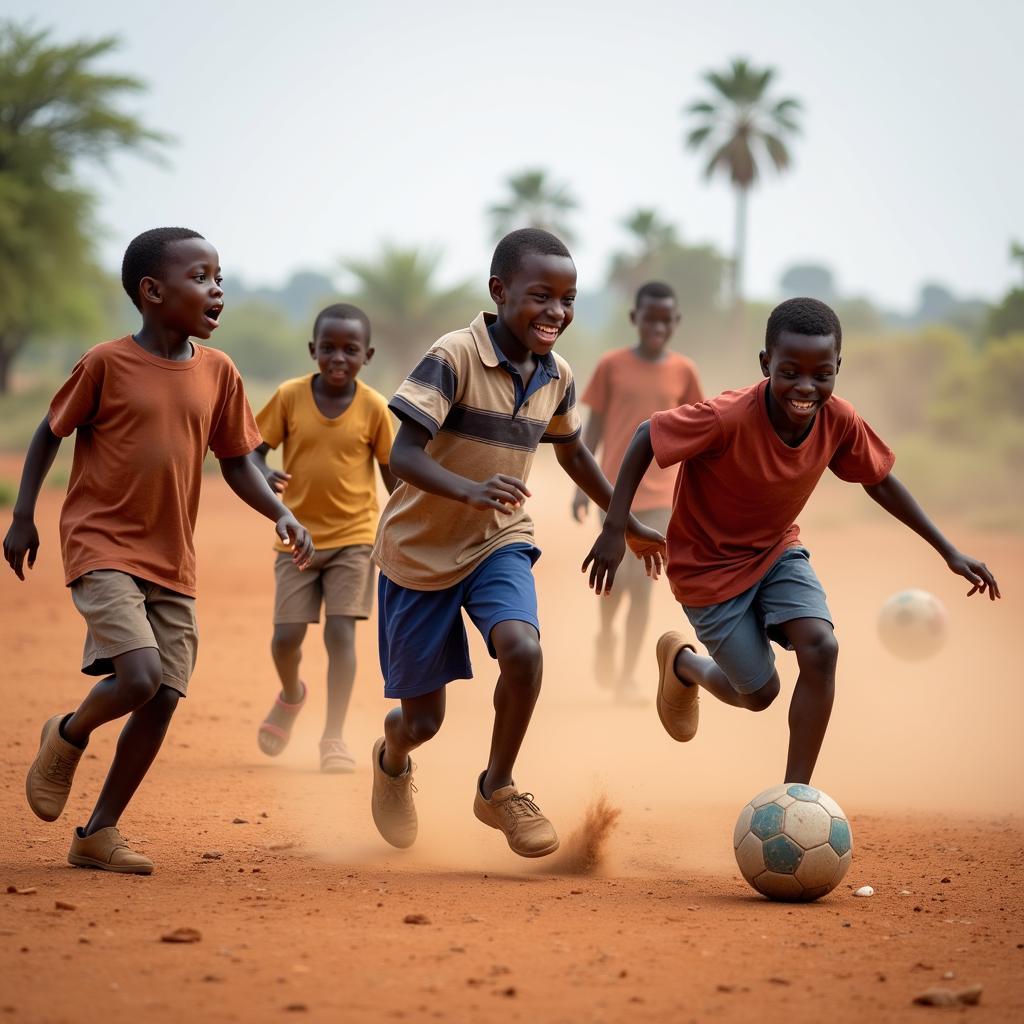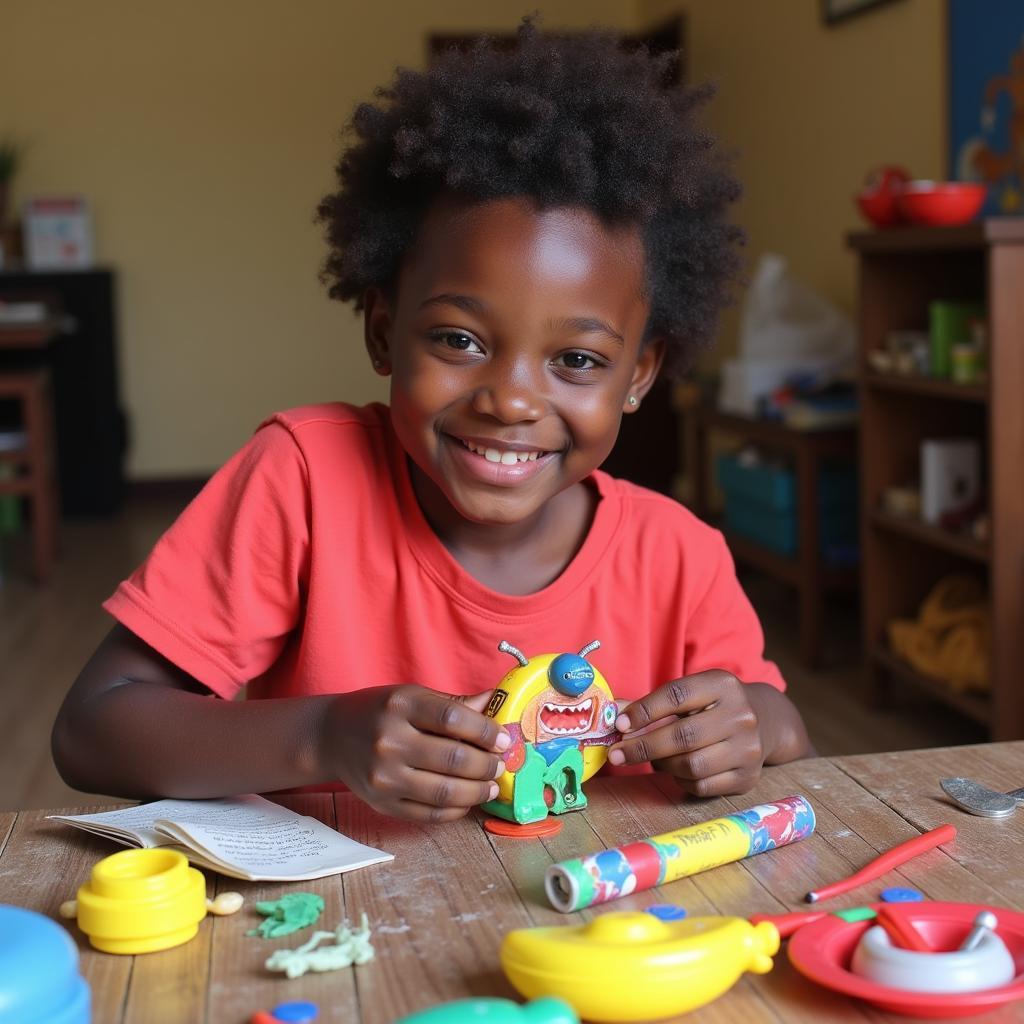The Joyful World of African Children Playing
African Children Playing embodies the spirit of resilience, creativity, and community that permeates the continent. From the bustling streets of Lagos to the serene landscapes of the Serengeti, play is an integral part of childhood, fostering development, learning, and social connection. This article explores the rich tapestry of play in Africa, highlighting its significance and the unique ways in which children across the continent engage in this fundamental human activity.
Games passed down through generations, often incorporating song, dance, and storytelling, connect children to their heritage and instill a sense of belonging. These playful interactions contribute significantly to their cognitive, physical, and emotional growth. Whether it’s crafting toys from natural materials or engaging in imaginative role-playing, African children playing demonstrates the power of resourcefulness and creativity. The simple joy derived from these activities speaks volumes about the resilience and adaptability of children in the face of various challenges.
The Importance of Play in African Culture
Play is not merely a pastime in Africa; it’s a vital component of a child’s development. It’s through play that children learn essential life skills, social norms, and cultural values. Traditional games often involve teamwork and cooperation, reinforcing the importance of community and interdependence. These activities also provide opportunities for children to develop problem-solving skills, enhance their creativity, and improve their communication.
For example, many African children learn about their environment and the natural world through play. They might create miniature villages from sticks and leaves, mimicking the adult world around them. This type of imaginative play fosters creativity and helps children develop a deeper understanding of their surroundings.
African children playing with water.
Traditional African Games and Their Significance
Across the continent, a diverse range of traditional games offers children engaging and educational experiences. Games like Mancala, played with small stones or seeds, teach strategic thinking and mathematical skills. Other games, involving singing and dancing, promote physical coordination and rhythmic abilities. These traditional games, passed down through generations, are a powerful way of preserving cultural heritage and instilling a sense of identity in children.
These games often reflect the daily lives and traditions of the communities where they are played. For instance, some games mimic hunting or farming activities, providing children with a playful introduction to essential skills and knowledge.
African Children Playing: A Celebration of Resilience and Creativity
Despite facing numerous challenges, African children demonstrate remarkable resilience and creativity in their play. They often create their own toys from readily available materials, such as discarded tires, bottle caps, and scraps of fabric. This resourcefulness not only provides entertainment but also nurtures their problem-solving skills and encourages innovation. Even in resource-constrained environments, African children find ways to transform ordinary objects into sources of joy and imagination.
African and white children playing.
The Role of Play in Child Development
Dr. Abena Owusu, a renowned child psychologist specializing in African cultures, explains: “Play is crucial for the holistic development of a child. It provides a safe space for them to explore their emotions, develop social skills, and build resilience.”
The joy and laughter that accompany play are not just fleeting moments of happiness; they are essential for a child’s emotional well-being. Play allows children to express themselves freely, process their experiences, and develop coping mechanisms for challenging situations.
Preserving Traditional Games in a Modernizing World
As Africa continues to modernize, there is a growing need to preserve traditional games and ensure they are not lost to future generations. These games are not just a source of entertainment; they are a valuable cultural asset that provides children with a connection to their heritage and instills important values. Efforts are being made to document and promote these games, ensuring their continued relevance in a rapidly changing world.
How Can We Support African Children’s Play?
Supporting African children’s play requires a multifaceted approach. Investing in education and providing access to safe and stimulating play spaces are crucial steps. Promoting the value of traditional games and supporting local initiatives that preserve cultural heritage are also essential.
African homes comedy mother chid.
 African Children Playing Football in a Dusty Field
African Children Playing Football in a Dusty Field
Conclusion
African children playing is a testament to the power of play in fostering joy, resilience, and creativity. From traditional games passed down through generations to innovative play using readily available materials, African children demonstrate the fundamental importance of play in child development and cultural preservation. By supporting their play, we invest in their future and help preserve the rich cultural tapestry of the continent. African children playing is a celebration of life, learning, and the enduring spirit of childhood.
 African Girl Creating a Toy from Recycled Materials
African Girl Creating a Toy from Recycled Materials
FAQs
-
What are some common traditional African games? Mancala, string games, and various singing and dancing games are popular.
-
How does play contribute to a child’s development in Africa? It fosters cognitive, physical, social, and emotional growth.
-
Why is it important to preserve traditional African games? They are a valuable part of cultural heritage and teach important life skills.
-
How can I support African children’s play? By donating to organizations that promote education and play, or by supporting local initiatives.
-
What are some examples of toys African children create from recycled materials? Toys from bottle caps, wire, and discarded tires are common.
-
How does play help African children develop resilience? It allows them to cope with challenges and adapt to different situations.
-
What is the significance of play in African culture? It’s a vital part of childhood, learning, and community building.
For further support, please contact us: Phone: +255768904061, Email: [email protected] or visit our office at Mbarali DC Mawindi, Kangaga, Tanzania. We offer 24/7 customer support.
